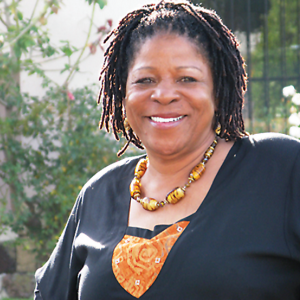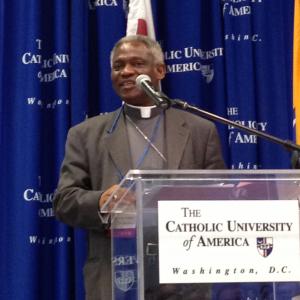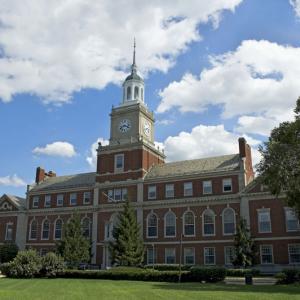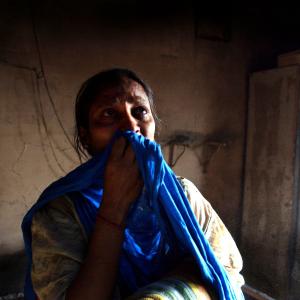Dawn Cherie Araujo’s love of writing began at the age of 12 with her first novella, and her love for magazine journalism blossomed in high school where she served as editor of the school magazine and co-editor of the school’s literary magazine.
In 2010, she graduated from Ball State University’s magazine journalism program where she served as assistant editor of Ball Bearings magazine. She will complete her master’s degree in urban and intercultural studies from Cincinnati Bible Seminary in December 2012. Dawn is a member of the Religion Newswriters Association and the International Association of Religion Journalists, and her favorite journalists are Gay Talese and Christiane Amanpour.
When she’s not geeking out about journalism and religion, Dawn is passionate about human rights (particularly as it relates to food workers and child soldiers), Russian literature, and yoga. Dawn is a recent Pinterest convert and likes making her own organic beauty products.
Posts By This Author
Journalism and the Sacred Work of Disseminating Knowledge
There’s an old adage in journalism that if it bleeds, it leads. It sounds kind of savage and it’s often that principle people quip when complaining about excessive violence in the news.
That criticism isn’t wrong. Just watch 10 minutes of nightly news, and you’ll probably see nothing but murders and robberies, as if that’s the only thing that happens on a daily basis.
But what I think we forget when criticizing the bleed/lead principle is the inherent value it places on human life. The way I learned it in journalism school, “if it bleeds, it leads” means that people matter. It means that the loss of human life should never be something we consider a banality and that if there’s bloodshed, we, as journalists, have an obligation to report it.
In a perfect world, that would work. (Well, actually, in a perfect world, there would be no bloodshed for journalists to report, but you know what I mean.) But the problem that Gareth Higgins identifies in “A Newsfeed of Fear” (Sojourners, May 2015) is not so much the excessive coverage of suffering, but the callous coverage of it.
Instead of promoting the sanctity of life as I think it was originally intended, media coverage of crime and violence has been twisted into a formulaic script that serves only to create the must-watch, must-read news that brings in advertising dollars. And it can be hard to stomach that much disingenuousness.
Yet the solution is not a positive-news only model. There are media outlets — largely Christian ones — trying this, but I don’t think this approach adequately addresses what’s wrong with the mainstream media. For one thing, it does nothing to fix the problem of formulaic, disingenuous stories. People can fake happiness, too, you know. Furthermore, there are times when we actually need more bad news — like, for example, when black women disappear or when migrant farmworkers are being abused.
Grace-Filled Moments
With gun violence on the rise in Indianapolis, local churches are responding with prayer and a ministry of presence.
ON A COOL, windy October evening, the family of 23-year-old Dominic Amey Jr. stands outside and waits. They’re waiting for someone to tell them how and why Amey, a father of three, was shot and killed behind the house a week before. So they pray and they wait. But there aren’t any answers—at least none that night.
Joe Zelenka, a 74-year-old Catholic, wishes he had answers, but instead he offers the family what he has: prayers for peace and healing.
Zelenka has done this many times (probably too many times, if you ask him) since he began coordinating the Church Federation of Greater Indianapolis’ prayer vigils for homicide victims—many killed by gun violence—nearly 11 years ago. At every vigil, standing at the scene of the crime, Zelenka reads scripture, offers a prayer, and then invites those present to pray aloud if they so choose.
“I think it’s important that we bring God’s presence where violence has occurred,” he said. The vigils pre-date Zelenka’s tenure with the Church Federation—he’s the fourth person to hold the position of vigil coordinator since January 1996, when the Church Federation began holding a prayer vigil at the site of every violent homicide in the greater Indianapolis area.
AUDIO: Kathy Kelly's Defiant Peace Activism
As Ramzi Kysia writes in "The Song Remains" (Sojourners, August 2013), after decades of work, Kathy Kelly’s commitment to peace and nonviolence remains strong. When Sojourners editorial assistant, Dawn Araujo, caught up with her in June, Kelly was between visits to Afghanistan and her work with the Afghan Peace Volunteers. She was spending her “down” time protesting drones, nuclear weapons, and organizing a U.S.
Four Questions for Khaipi
Khaipi, a peace studies professor in Thailand and a Chin religious freedom activist
Bio: "Khaipi" (real name withheld) is a peace studies professor in Thailand and a Chin religious freedom activist who served as researcher for the Chin Human Rights Organization's 2012 report detailing abuses against ethnic and religious minorities in Burma.chro.ca
1. What is at the root of the persecution of Christians in Burma?
There is an unwritten policy called “Burmanization,” which means that to be Burmese you have to be a Buddhist and you have to speak Burmese. The Chin people are not allowed to practice Christianity, and we are not allowed to study our own ethnic languages. But it’s not all about religion: They are attacking our ethnic identity because Christianity has become our identity.
Before Christianity came to the Chin people, they practiced an indigenous religion. In this religion, they believed in an Almighty One who created the world. In 1899, the very first American Baptist missionaries came to Chin state, and when they talked about the Christian God, our forefathers could adopt it very easily because it was very close to that indigenous belief. Today, when the Burmese military junta persecutes us, they say, “Okay, we want to take out this kind of Western religion.” But for us, once we believed in God, it became our religion, not a Western religion anymore.
AUDIO: The Cosas, an Iraqi Christian family
An interview with an Iraqi Christian family
Five Questions for Susan Burton
Susan Burton, founder of A New Way of Life Reentry Project
Bio: Founder of A New Way of Life Reentry Project in California, which has provided housing and support for more than 500 formerly incarcerated women. anewwayoflife.org
1. What motivated you to start A New Way of Life in 1998?
Through the kindness of a special person, I was able to access treatment services in Santa Monica [Calif.] after the sixth and final time I was released from prison. This was a new phenomenon for me. I am originally from South Los Angeles, and I was amazed that such resources were available in this more-affluent part of the city. I began to wonder why those same resources were not available in my home community—an area so heavily impacted by the “war on drugs.” I knew the need was desperate, and I wanted to bring those resources to South L.A. My work since then has been, and continues to be, a work of faith. I step out in faith, and God shows up.
I can’t think of a way that it’s good for anyone. The current system treats everyone inhumanely. It puts them into the category of slaves. It exploits their families. It kills their hopes and dreams. Our mission is to address the needs of people who have been negatively and cruelly treated by the criminal justice system and to restore their hopes and dreams by treating them with dignity and respect.
No Room at the Inn: Women's Facility Loses Battle With Fortune 500 Company
It’s a hard truth that, in the real world, Goliath sometimes beats David.
In the July issue of Sojourners, I wrote about the battle to save the Anna Louise Inn and how Cincinnati’s faith community has come together for the fight. Run by Cincinnati Union Bethel, a small non-profit, the Inn has provided safe and affordable housing for women in the city for 104 years and is one of Cincinnati’s most revered institutions.
But last Monday, Cincinnati Union Bethel announced it was selling the Anna Louise Inn to Western and & Southern Financial Group after a two-year legal battle.
“The needed resources, time and energy to this litigation has diverted focus from our other successful programs,” they wrote on their website. “This settlement and purchase agreement allow us to dedicate ourselves to our mission of serving women and children.”
Cincinnati Union Bethel owns both the Inn and the land on which it sits, but Western & Southern – a Fortune 500 company located across the street – wanted the property to build high-end real estate. So, when Cincinnati Union Bethel received $13 million in federal tax credits to renovate the Inn, Western & Southern sued them and the city of Cincinnati.
AUDIO: The Battle for the Anna Louise Inn
Dawn Araujo's audio report
Dawn Araujo's audio report
PHOTOS: A Historical Look at the Anna Louise Inn
The Anna Louise Inn first opened in 1909. Built on the Taft family’s front yard, the Inn provided safe and affordable housing for women in Cincinnati. Since then, the Inn has become a revered Cincinnati institution. Click on the gallery below to view some images of the Inn’s history.
No Room at the Inn
Cincinnati's faith leaders cross denominational lines to stand up to a corporate bully.
REV. SUSAN QUINN BRYAN walked into a meeting of the Friends of the Anna Louise Inn fully prepared for a room brimming with people. Instead, Bryan and the five other Presbyterian pastors she had brought with her doubled the meeting’s total attendance. Bryan was stupefied.
When she moved to Cincinnati in 2005 to pastor Mount Auburn Presbyterian Church, several of her congregants had taken her to the Anna Louise Inn, claiming it as one of the things they loved most about the city. And yet, in its time of need, hardly anyone had come to the Inn’s rescue. It would take several minutes before an even more startling realization came to Bryan.
“As [people] began talking, I thought, ‘Where’s the church? How can the church stand silent while this is happening?’” she said. “So I organized a breakfast and just sent out emails to all the clergy I could find.”
About 25 Cincinnati faith leaders came to Bryan’s breakfast, and out of it emerged an ecumenical force, crossing denominational divides to rally behind one of Cincinnati’s most revered institutions.
THE BATTLE FOR the Anna Louise Inn began in 2007 after Cincinnati Union Bethel (CUB), the social service agency that operates the Inn, decided the Inn needed updated facilities.
'Pacem in Terris' — 50 Years Later
On April 11, 1963 Pope John XXIII published an encyclical some initially dismissed as naive and myopic, as too liberal and too lofty. But today, his "Pacem in Terris" is generally lauded as genius and prophetic – well ahead of its time on the issues of human rights, peace, and equality.
As Maryann Cusimano Love, a Catholic professor of international relations, notes, the same year “Pacem in Terris” was published, spelling out the theological mandate for political and social equality for all people, women in Spain were not allowed to open bank accounts, Nelson Mandela was standing trial for fighting apartheid, and Walter Ciszek was serving time in a Soviet gulag simply for being Catholic.
On Monday and Tuesday, the Catholic Peacebuilding Network hosted a two-day conference at the Catholic University of America, commemorating 50 years since the publication of "Pacem in Terris.”
New Film Explores Export of American Culture Wars to Eastern Africa
When Ugandan parliament member, David Bahati, introduced the so-called “Kill the Gays Bill” in 2009, many Americans were shocked, including a group of 60 ecumenical Christian leaders who released a statement deploring the bill.
But as Frank Mugisha told Sojourners magazine earlier this year, what is perhaps more upsetting, albeit little known, is the level of influence American evangelicals have had in crafting Uganda’s violent homophobia.
Academy Award-winning director Roger Ross Williams hopes to put this issue front and center with his new film God Loves Uganda, which made its Washington, D.C., premiere Tuesday night at the Human Rights Campaign headquarters.
The film opens with Rev. Kapaya Kaoma, an Episcopal priest from Boston by way of Zambia, who went to Uganda in 2009 to study the relationship between American conservatives and the Ugandan people. What he found was that “religion was being used to demonize and even to kill.”
Howard's Liberation Theology Weekend Reflects on Black Church's 'Identity Crisis'
For many pundits and observers, last week’s election proved that a “new normal” has emerged in America: record numbers of women and ethnic minorities were voted into the House and the Senate, and the House will also see its first Hindu representative in January. Voters in Maine and Maryland approved same-sex marriage, and a diverse coalition of social minorities came together to re-elect the nation's first black president.
But for black theologians, the election has also been an occasion to reflect on how the black church faces an identity crisis, losing track of its mission to lead the way in issues of justice and liberation.
“Something happened to the black church after the assassination of Martin Luther King, Jr., in 1968,” said Dr. Gayraud Wilmore, one of the founders of black theology, adding that when King died, it seemed that in black congregations, the enthusiasm for black history and racial identity also died.
And for Wilmore, the last 44 years — even the election and re-election of a black president — have done little to abate this crisis.
Incarceration Nation
Putting Americans behind bars is becoming an increasingly lucrative business.
Putting Americans behind bars is becoming an increasingly lucrative business.
Weapons of Terror
When the United States dropped atomic bombs on the Japanese cities of Hiroshima and Nagasaki in 1945, the world was ushered into a period of weapons paranoia. The Cold War, of course, was hallmarked by the obsessive weapons one-upmanship of the United States and the Soviet Union.
Who, then, would have thought that in the 21st century, the seeming weapon of choice would not be some sort of super-nuclear missile or an ultra-deadly biological toxin, but that it would, instead, be women?
“Women are being used as weapons of terror,” Dr. Rubina Greenwood told an audience last week at a congressional briefing on the rights of minority women in Pakistan organized by the Hindu American Foundation.





